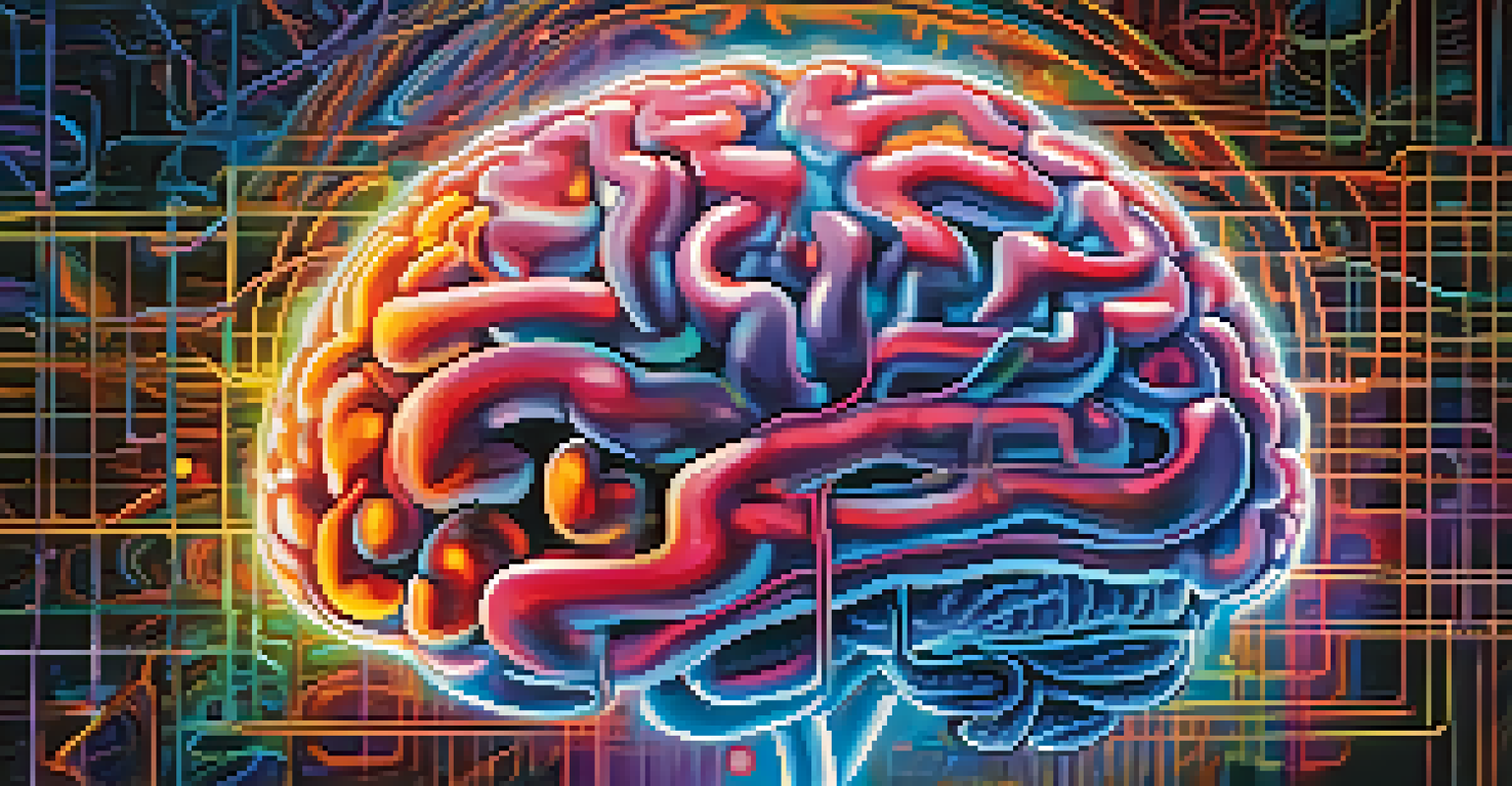The Science Behind Hallucinogens and Mental Health Recovery

What Are Hallucinogens and Their Effects?
Hallucinogens are substances that alter perception, mood, and cognitive processes. Common examples include psilocybin (found in magic mushrooms) and LSD. These substances can lead to vivid visual and auditory hallucinations, as well as profound changes in thinking and feeling.
The experience of hallucinogens can lead to profound insights, revealing underlying issues that may have been obscured by conventional thinking.
The effects of hallucinogens can vary greatly from person to person, influenced by factors like dosage, setting, and individual mental state. Some users report a sense of connectedness, heightened creativity, or spiritual experiences, while others may encounter anxiety or fear. Understanding these effects is crucial for exploring their potential therapeutic uses.
Recent research has started to reveal how these substances interact with the brain, particularly in areas associated with mood regulation. This has prompted a closer look at how they might be leveraged in mental health recovery.
The Brain Chemistry Behind Hallucinogens
Hallucinogens primarily affect serotonin receptors in the brain, particularly the 5-HT2A receptor. This interaction can lead to altered states of consciousness and shifts in perception. By binding to these receptors, hallucinogens can change neural pathways and promote new patterns of thinking.

Interestingly, these changes in brain chemistry can have lasting effects. Research suggests that even after the hallucinogenic experience, individuals may continue to show improved mood and cognitive flexibility. This phenomenon raises intriguing questions about the potential for long-term benefits in mental health treatment.
Hallucinogens Alter Perception
These substances like psilocybin and LSD can lead to vivid hallucinations and significant changes in mood and cognition.
Moreover, studies have indicated that hallucinogens may promote neuroplasticity, the brain's ability to reorganize and adapt. This could offer a promising avenue for addressing various mental health conditions, such as depression and PTSD.
Hallucinogens and Mental Health Disorders
Several studies have explored the use of hallucinogens in treating mental health disorders. Conditions like depression, anxiety, and PTSD are receiving increasing attention in this context. For instance, clinical trials have shown that psilocybin can lead to significant reductions in depressive symptoms.
Psychedelics can help us to uncover and confront the deep-seated traumas that shape our lives and often stifle our mental health.
Participants in these studies often report profound insights and emotional breakthroughs during their experiences. This therapeutic journey can facilitate a deeper understanding of their mental health struggles, making it easier to address underlying issues. The therapeutic setting is crucial, providing a safe environment for these experiences to unfold.
However, while the results are promising, more research is needed to fully understand the implications and long-term effects. It’s essential to approach this area with careful consideration and scientific rigor.
The Role of Set and Setting in Therapeutic Use
The concept of 'set and setting' is foundational in understanding the effects of hallucinogens. 'Set' refers to the mindset of the individual, while 'setting' relates to the environment in which the experience occurs. Both factors play a critical role in shaping the outcomes of hallucinogenic experiences.
In therapeutic contexts, a calm, supportive setting can enhance positive experiences and minimize risks. Trained facilitators often guide sessions to ensure participants feel safe and understood, which can lead to more profound insights and healing.
Therapeutic Potential in Mental Health
Research indicates that hallucinogens may offer lasting benefits for mental health conditions like depression and PTSD.
Conversely, a negative mindset or an uncomfortable environment can lead to distressing experiences, known as 'bad trips.' This highlights the importance of careful preparation and professional oversight in harnessing the potential of hallucinogens for mental health recovery.
Challenges and Risks of Using Hallucinogens
Despite their potential benefits, the use of hallucinogens is not without risks. Individuals with a history of psychotic disorders or severe anxiety may experience exacerbated symptoms. It's crucial for prospective users to undergo thorough mental health screenings before engaging in any therapeutic use.
Additionally, the legal status of hallucinogens varies widely, which can complicate access to legitimate treatment. While some areas have begun to decriminalize or regulate their use, others remain strictly prohibitive. This inconsistency can hinder research and the development of effective therapeutic protocols.
Educating both the public and healthcare providers about the risks and benefits is essential. A clear understanding can foster safer practices and better decision-making regarding the use of hallucinogens in mental health recovery.
Current Research and Future Directions
Research into the therapeutic use of hallucinogens is rapidly expanding, with numerous studies underway. Institutions like Johns Hopkins and Imperial College London are at the forefront, investigating various substances and their effects on mental health. This research aims to establish protocols and understand the optimal conditions for therapeutic use.
Findings are contributing to a growing body of evidence supporting hallucinogens as legitimate treatment options. As knowledge evolves, there is hope for more structured and scientifically validated approaches to utilizing these substances in therapy.
Importance of Set and Setting
The mindset and environment in which hallucinogens are used play a crucial role in determining the outcomes of the experience.
The future holds promise, but it also requires careful consideration of ethical implications and safety protocols. Collaboration between researchers, clinicians, and policymakers will be crucial in shaping the landscape of mental health treatment.
Personal Stories: Transformative Experiences
Personal narratives can be powerful in illustrating the impact of hallucinogens on mental health recovery. Many individuals have shared their journeys, detailing how these substances helped them overcome deep-seated trauma or debilitating anxiety. These testimonies often highlight moments of clarity and profound healing.
For instance, someone struggling with PTSD might describe their experience of confronting memories in a new light, facilitated by a guided hallucinogenic session. This transformative process can foster resilience and a renewed sense of hope, showcasing the potential for recovery.

Such stories serve not only to validate the experiences of individuals but also to inspire further inquiry into the therapeutic benefits of hallucinogens. They remind us of the human element at the heart of mental health recovery.